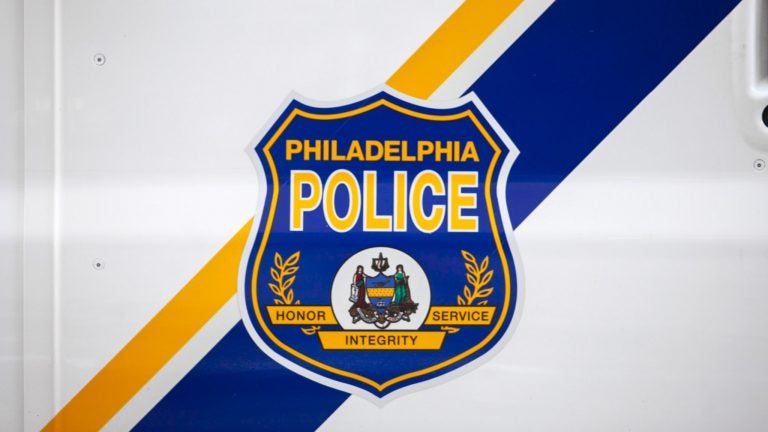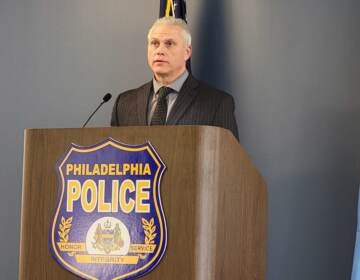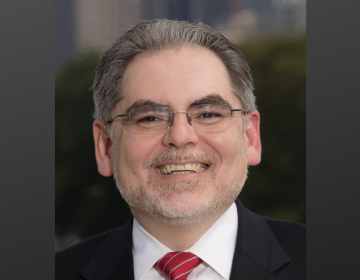Those Philly police with offensive Facebook posts? Some have a long history of complaints
Several of the officers named in the Facebook database, compiled by a group called the Plain View Project, have been targets of multiple misconduct probes in the past.

(Miguel Martinez/Billy Penn)
Ten Philadelphia police officers have been relegated to desk duty following the release of a database of racist and violent Facebook posts allegedly linked to 330 city cops. The reassignment is the first public action taken after Police Commissioner Richard Ross promised an investigation. Mayor Jim Kenney and District Attorney Larry Krasner have also released statements condemning the behavior.
Some of the officers names may be familiar. Several people named in the Facebook database, compiled by a group called the Plain View Project, have been targets of multiple misconduct probes in the past.
But before being nationally embarrassed by the release, which was blasted around the internet by BuzzFeed News, Philadelphia officials dismissed many of those allegations.
On the streets of his West Philadelphia police district, Officer Reuban Ondarza was supposed to be one of Philadelphia’s finest. On Facebook, however, he posted disturbing images mocking beaten and bloodied criminal suspects — and city records show he was subject to seven prior internal investigations between 2013 and 2017, for alleged misconduct far more serious than an offensive social media post.
In 2015, investigators found that Ondarza and six other officers had falsified information and ignored departmental guidelines during car stops that ended with warrantless searches –– with officers allegedly prying open motorists’ locked glove boxes.
Another officer, Kevin Lewis, was also named in the database for a series of offensive posts, mocking immigrants and ridiculing a beaten criminal suspect. He has been involved in 11 internal affairs investigations over five years, spanning 23 different alleged departmental violations. None were deemed credible by internal investigators.
Now — as a result of Facebook posts — both Ondarza and Lewis may face real consequences, according to the Philadelphia Inquirer. Both were revealed to be targets of a PPD Internal Affairs investigation launched after the Plain View Project turned over information in February about officers with particularly concerning social media pages.
Officials would not confirm whether Ondarza or Lewis were among the group placed on desk duty. Nor could a department spokesman say why officers had seemingly faced few repercussions until their questionable activities online became a public spectacle.
Complaints? Lawsuits? All ignored
Records show that the vast majority of Philadelphia police officers receive either zero or one civilian complaint over a five-year period, making Ondarza and Lewis clear outliers.
The database contains at least 139 Philly officers who were previously named in federal lawsuits over police brutality — including Ondarza.
He was implicated in a civilian suit filed in 2017 by a driver who said she suffered an ankle fracture when officers beat her during a car stop. Internal investigators initially dismissed her complaint, but later the motorist sued the city. The case was settled out of court for an undisclosed amount.
A week after his alleged brutality case was settled, Ondarza changed his account’s profile picture to a photograph of a beaten and bloodied criminal suspect.
These officers were both profiled in a Philly Weekly investigation last year about the failure to discipline police who had received numerous civilian complaints. But after the release of that story, the department appears to have taken few steps to rein in the officers.
Lewis and Ondarza’s former district captain, interviewed for that story, described both men as exemplary officers, and said he could only vaguely recall any disciplinary issues.
A broken warning system
The disciplinary records for all 330 police officers whose Facebook posts were flagged by the Plain View Project are not readily available to the public.
When Mayor Kenney ordered the release of civilian complaints and their disciplinary outcomes in 2017, his administration cloaked the officers’ identities — and that of the complainants — by using their initials.
Earlier this year, the city went further and began stripping even those basic identifiers from its public database.
“The PPD determined that officer initials could be interpreted erroneously and cause confusion –– since multiple officers can have the same initials,” said Kenney spokesperson Mike Dunn.
According to a WHYY/Billy Penn analysis of recent disciplinary data, just over 100 officers on the 7,000-member force appear to have garnered as many complaints as Ondarza and Lewis did over a five year period.
Most allegations made by civilians are ultimately tossed out. Only 14% of civilian complaints since 2015 have been deemed credible by investigators in the past five years –– and even fewer face any disciplinary action.
Police watchdogs have long called for departments to address high volumes of complaints, credible or not, to put pressure on rogue officers.
Deciding who gets disciplined
On Thursday, Hans Menos, director in the city’s civilian Police Advisory Commission, said both the Facebook posts and the officers’ disciplinary records should be used to determine if officers should lose their jobs.
“We should look at each of them individually,” Menos said. “Some folks, their posts should be enough. Other folks, the totality of their [records] should be enough.”
District Attorney Larry Krasner said his office already consults disciplinary records to identify credibility issues that could prevent officers from testifying in court. This week, he said his office will use the new Facebook posts as well.
Protesters plan to demonstrate outside the police headquarters Friday to call for dismissals over the social media posts.
Police Commissioner Richard Ross announced that his department had retained an outside law firm to review the database. But Ross and Fraternal Order of Police President John McNesby are keeping quiet. Both refused interviews this week.
But some named officers didn’t shy away from going public — on social media, no less.
Officer Milord Celce Jr., who is also being investigated over his earlier social media habits, posted a news article on his Facebook page about the database.
“As if I wasn’t already famous out here,” he wrote in a since-removed Facebook post last weekend. “They can say whatever they want about me, I’m pretty sure I’m still gonna be the phenomenal cop that I’ve always been. I’ve gotta send them a thank you letter,” he wrote.
Ondarza, who recently modified his profile name to “Rub Odee” to conceal his identity, commented to back him up.
“They need to start paying me to use my name in articles,” he joked.
WHYY is your source for fact-based, in-depth journalism and information. As a nonprofit organization, we rely on financial support from readers like you. Please give today.




